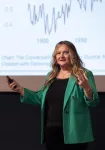(Press-News.org) Researchers have conducted trials using a software capable of detecting intricate details of emotions that remain hidden to the human eye.
The software, which uses an ‘artificial net’ to map key features of the face, can evaluate the intensities of multiple different facial expressions simultaneously.
The University of Bristol and Manchester Metropolitan University team worked with Bristol’s Children of the 90s study participants to see how well computational methods could capture authentic human emotions amidst everyday family life. This included the use of videos taken at home, captured by headcams worn by babies during interactions with their parents.
The findings, published in Frontiers, show that scientists can use machine learning techniques to accurately predict human judgements of parent facial expressions based on the computers’ decisions.
Lead author Romana Burgess, PhD student on the EPSRC Digital Health and Care CDT in the School of Electrical, Electronic and Mechanical Engineering at the University of Bristol, explained: “Humans experience complicated emotions – the algorithms tell us that someone can be 5% sad or 10% happy, for example.
“Using computational methods to detect facial expressions from video data can be very accurate, when the videos are of high quality and represent optimal conditions - for instance, when videos are recorded in rooms with good lighting, when participants are sat face-on with the camera, and when glasses or long hair are kept from blocking the face.
“We were intrigued by their performance in the chaotic, real-world settings of family homes.
“The software detected a face in around 25% of the videos taken in real world conditions, reflecting the difficulty in evaluating faces in these kind of dynamic interactions.”
The team used data from the Children of the 90s health study – also known as Avon Longitudinal Study of Parents and Children (ALSPAC). Parents were invited to attend a clinic at the University of Bristol when their babies were 6 months old.
At the clinic, as a part of the ERC MHINT Headcam Study, parents were provided with two wearable headcams to take home and use during interactions with their babies. Parents and infants both wore the headcams during feeding and play interactions.
They then used an ‘automated facial coding’ software to computationally analyse parents’ facial expressions in the videos and had human coders analyse the facial expressions in the same videos.
The team quantified how frequently the software was able to detect the face in the video, and evaluated how often the humans and the software agreed on facial expressions.
Finally, they used machine learning to predict human judgements based on the computers decisions.
Romana said: “Deploying automated facial analysis in the parents’ home environment could change how we detect early signs of mood or mental health disorders, such as postnatal depression.
“For instance, we might expect parents with depression to show more sad expressions and less happy facial expressions.
Professor Rebecca Pearson from Manchester Metropolitan University, co-author and PI of the ERC project explained: “These conditions could be better understood through subtle nuances in parents' facial expressions, providing early intervention opportunities that were once unimaginable. For example, most parents will try to ‘mask’ their own distress and appear ‘ok’ to those around them. More subtle combinations can be picked up by the software, including expressions that are a mix of sadness and joy or that change quickly.”
Now the team plan to explore the use of automated facial coding in the home environment as a tool to understand mood and mental health disorders and interactions. This will help to pioneer a new era of health monitoring, bringing innovative science directly into the home.
Romana concluded: “Our research used wearable headcams to capture genuine, unscripted emotions in everyday parent-infant interactions. Together with the use of cutting-edge computational techniques, this means we can uncover hidden details that were previously unattainable by the human eye, changing how we understand parents’ real emotions during interactions with their babies.”
As an extension to the ERC project, headcam data is now being collected in teenagers, with the plan to use the same methods to understand complex teen emotions at home, see Teencam Pilot Study - Institute of Population Health - University of Liverpool.
Professor Nic Timpson, Principal Investigator for Children of the 90s commented: “Bristol’s families have been involved for decades in important health research and here they are pioneering new ways of studying mental health using this real-life headcam footage.”
Paper:
‘Quantifying the efficacy of an automated facial coding software using videos of parents’ by Romana Burgess et al in Frontiers.
END
Software can detect hidden and complex emotions in parents
2023-10-05
ELSE PRESS RELEASES FROM THIS DATE:
$2 million grant boosts technological advancements in cutting-edge cell therapy manufacturing facility
2023-10-05
The Keck School of Medicine of USC has received $2 million from the California Institute of Regenerative Medicine (CIRM) to further augment its newly launched cGMP Laboratory, a state-of-the-art facility designed to advance early-stage research into clinically viable cell and gene therapies. To expedite the translation of these therapies from the lab to the clinic, the facility needs advanced technological know-how, streamlined operations and strict protocols for developing and testing these products, all of which ...
Texas Children’s Bariatric Surgery Program receives prestigious national accreditation
2023-10-05
HOUSTON (October 4, 2023) – Texas Children’s Hospital is proud to announce that its Adolescent Bariatric Surgery Program has received national accreditation from the Metabolic and Bariatric Surgery Accreditation and Quality Improvement Program (MBSAQIP).
Texas Children’s Hospital The Woodlands is the only Bariatric Surgery Center in the state of Texas that serves to an adolescent-only patient population with a multidisciplinary clinical staff who is certified to meet the surgical, medical and psychological needs of ...
Two-dimensional compounds can capture carbon from the air
2023-10-05
Some of the thinnest materials known to mankind may provide solutions to scientists in their quest to curb the effects of global warming.
Known as MXene and MBene compounds, these substances are only a few atoms thick, making them two-dimensional. Because of their large surface area, the materials have the potential to absorb carbon dioxide molecules from the atmosphere, which could help reduce the harmful effects of climate change by safely sequestering carbon dioxide.
In a paper published Oct. 4 in the journal Chem, UC Riverside professor Mihri Ozkan and her co-authors explain the potential of MXenes and MBenes in carbon capture technologies.
“In this review, ...
New type of tiny wasp comes with mysterious, cloud-like structures at ends of antennae
2023-10-05
CORVALLIS, Ore. – Fossil researchers have discovered a novel genus and species of tiny wasp with a mysterious, bulbous structure at the end of each antenna.
The female micro-wasp was described from 100-million-year-old Burmese amber in a study led by George Poinar Jr., who holds a courtesy appointment in the Oregon State University College of Science.
Poinar and Fernando Vega, an independent researcher based in Silver Spring, Maryland, have some ideas about the “clouds” on the ...
Tirzepatide is as effective at treating early-onset type 2 diabetes as diabetes diagnosed later in life
2023-10-05
Tirzepatide is as effective at treating early-onset type 2 diabetes (T2D), a more aggressive form of the condition that normally responds less well to treatment, as it is at treating T2D diagnosed later in life, new research being presented at the Annual Meeting of the European Association for the Study of Diabetes (EASD) in Hamburg, Germany (2-6 Oct) has found.
Tirzepatide belongs to a new class of drugs that mimic the effect of two hormones involved in blood sugar control and appetite suppression, ...
Commonly prescribed antibiotic, antipsychotic and prokinetic drugs are associated with a higher risk of sudden cardiac arrest (SCA) in people with type 2 diabetes, study finds
2023-10-05
New research being presented at the Annual Meeting of the European Association for the Study of Diabetes (EASD) in Hamburg, Germany (2-6 Oct) has identified a range of characteristics associated with a higher risk of sudden cardiac arrest in individuals with type 2 diabetes.
These include the some commonly prescribed antibiotic and antipsychotic drugs, prokinetics (drugs used to treat gastrointestinal symptoms such as nausea and vomiting) and low fasting blood sugar.
Sudden cardiac arrest (SCA) is a leading cause of death. ...
Study reveals distinct illness trajectory in the years leading up to type 2 diabetes diagnosis
2023-10-05
New research presented at this year’s Annual Meeting of The European Association for the Study of Diabetes (EASD), Hamburg (2-6 Oct), reveals a marked increase in several common conditions in the years leading up to, and immediately prior to, type 2 diabetes diagnosis, suggesting considerably earlier diagnosis might be possible in some patients.
“These novel insights into the onset and natural progression of type 2 diabetes, suggest an early phase of inflammation-related disease activity long before any clinical diagnosis of type 2 diabetes is made”, says senior author Dr Adrian Heald from Manchester ...
Is lasting remission of type 2 diabetes feasible in the real-world setting?
2023-10-05
At this year’s Annual Meeting of the European Association for the Study of Diabetes (EASD) in Hamburg, Germany (2-6 Oct) experts will discuss if lasting remission from diabetes is feasible in the real-world setting.
Professor Roy Taylor of Newcastle University, Newcastle, UK, will be speaking in support of the motion
Professor Taylor will argue that through a series of studies in which people with type 2 diabetes were put on low calorie diets, he has shown that lasting remission of type 2 diabetes is indeed feasible in the real world.
He will begin ...
Second international consensus report - clinical translation of precision diabetes medicine
2023-10-05
Precision medicine is part of the logical evolution of contemporary evidence-based medicine that seeks to reduce errors and optimise outcomes when making medical decisions and health recommendations. Diabetes affects hundreds of millions of people worldwide, many of whom will develop life-threatening complications and die prematurely.
“Diabetes recommendations often focus on what works well for the average person. However, because diabetes is an incredibly heterogeneous disease, few people are Mr or Mrs “average” and one-size-fits-all ...
Wastewater surveillance research provides a 12-day lead time for RSV season: new study
2023-10-04
In a first-of-its-kind study, researchers using wastewater surveillance over conventional indicators have predicted the start of the annual respiratory syncytial virus (RSV) season 12 days early, providing more lead time for hospital preparedness and the timely initiation of RSV prevention therapy provided by the province for at risk-infants and young children.
Published in Frontiers in Public Health, the study is the first to describe the relationship between wastewater measurements and clinical data for RSV and to use near real-time wastewater measurements to accurately identify the start of the RSV season.
Working in close collaboration with CHEO Research Institute (RI) ...



